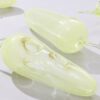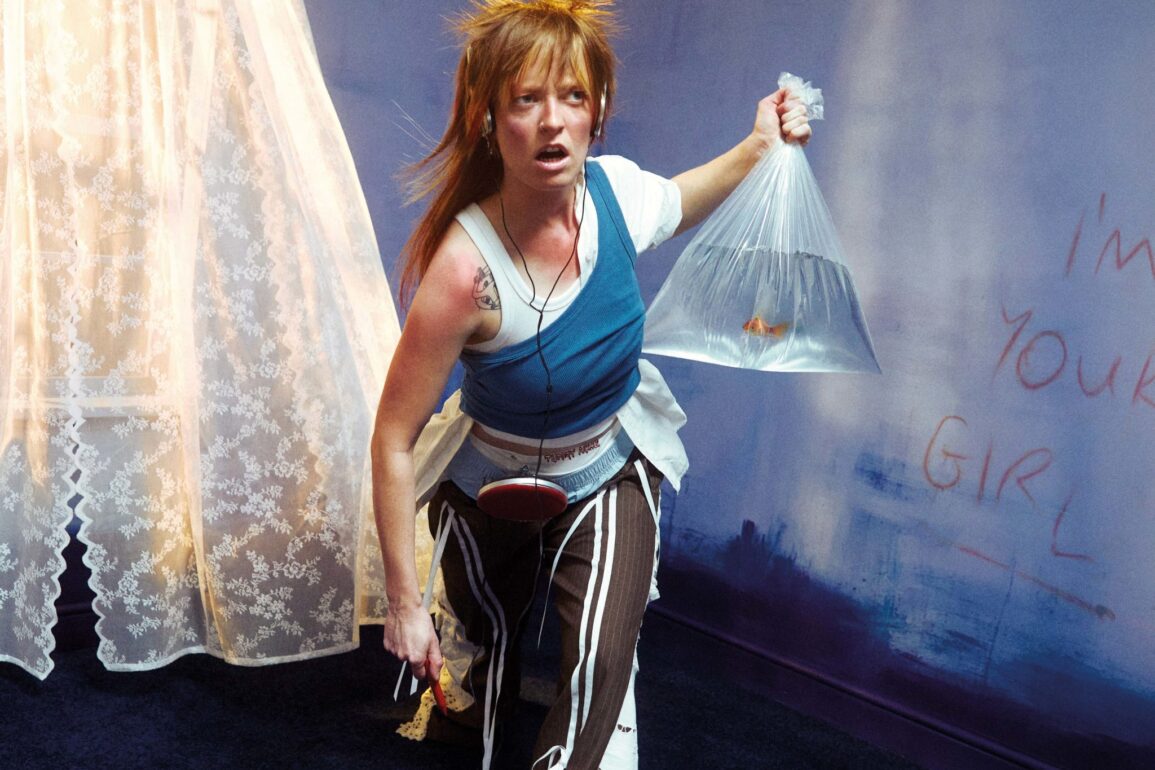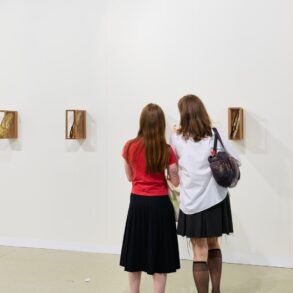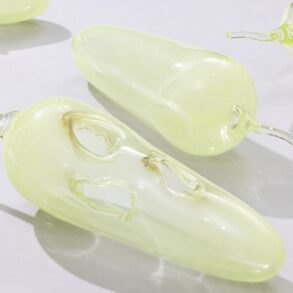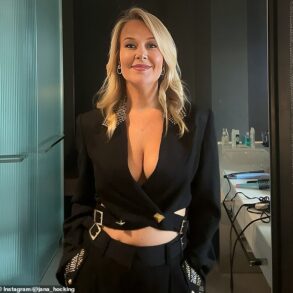Having established herself as one of Ireland’s best young artists with her acclaimed debut Woman On The Internet, Orla Gartland has now returned with a brilliant sophomore effort, Everybody Needs A Hero.
It might be said that Orla Gartland fell to earth some 29 years ago. Crash site: Dublin, Ireland. If there was a question about Gartland’s otherworldliness, it might have been posed when she was 13, the year she started learning guitar and posting videos to YouTube, writing “dramatic, angry” songs as any young teen might.
In classic Irish fashion, she never told her classmates or friends about her musical endeavours for fear of being seen as arrogant or attention-seeking. But something lingered inside her, a desire to keep pushing forward as a musical artist. Eventually, she’d have to take a real stab at making music.
With this came the personal realisation that she couldn’t succeed in Ireland.
“I didn’t see a place for myself there,” she tells me over Zoom from her London studio. “I’m desperately not trying to be a dick and name anyone, but there were a lot of men with acoustic guitars in Ireland at the time and I didn’t feel inspired.”
The year was 2014. The month, October. Struggling to break through, Orla didn’t know how to define herself in a male-dominated industry. London beckoned. There, she thought she could see a way to carve out a space for herself. On the day she finished school, she packed her bags and headed to the UK. It took until 2021 for her to release her long-awaited debut album, Woman On The Internet, following on from a slew of EP releases.
Advertisement
The coming-of-age record was a chart hit and confirmed Gartland as a force to be reckoned with. In more recent years, meanwhile, she has joined forces with Dodie, Greta Isaac and Martin Luke Brown to form the indie-pop supergroup FIZZ, which has further enhanced her reputation.
Now, she has unleashed her sophomore LP Everybody Needs A Hero, a 12-track masters thesis about the fallout of a long-term relationship and finding space for herself as a woman.
The opening track on Everybody Needs A Hero, ‘Both Can Be True’, is a piano-driven statement of intent. “I thought I knew it all,” Orla sings, “I had the nerve to feel so high above a learning curve.” It’s a pretty daring way to kick off the record.
“Towards the end of writing the album, I became kind of obsessed with the idea of superheroes,” explains Gartland. “Not like in the Marvel sense, but the image of a hero, someone who’s helping everyone out and doing it all. I looked at how that experience relates to being a woman, because I can see the instinct in me, in a lot of my female friends, in my mom and a lot of the women in my family. I feel we’re putting the pressure on ourselves – or maybe it’s external.
“We want to be thriving in all areas of our lives at once: wanting to be a great friend, thriving in our career, being a great partner, going to the gym and being healthy. There’s this feeling of spinning all the plates at once I sometimes get. I see it in myself, and a lot of the girls around me, but then we struggle to focus on ourselves. It’s replicated in the image we picked as the album cover, where I’m reaching for the phone.
“I liked the idea that I was answering the call and helping out everyone except for me, that sort of self-appointed manic hero. The title track at the end of the album is meant to be an ego death in a way, with me realising that I can’t do it all, and that I also need help and support. It’s hard to remember that you need to be your own hero, too.”
Advertisement
As a woman living in a post-feminist world, the realisation of the hero inside, and that you can only save yourself, often erupts from a place of necessity rather than hedonism.
“You know, it’s clearly a joy to go out with me. I’m so fucking mad,” she quips. “But really, any time I’ve been in a relationship, I’d struggle with retaining a sense of self. I see it in a lot of girls around me, where it’s so easy to pick a partner and just melt into that person, to fully assimilate into moving through the world as a unit. And not to be pessimistic, but I’m always like: where does that leave you when things don’t work out? Where does that leave you if you don’t have friends of your own or hobbies you enjoy?
“There’s a song towards the end of the album called ‘Who Am I?’, which is the most head-on song about that feeling. It’s about that moment where you get so lost in something that you have a bit of an existential crisis, and you’re like, ‘If I exist as all these things to you, where does that leave me when I take you out of the picture?’ It’s a scary thing to be so exposed in that way at the end of a relationship, but it can be very good, and permit a lot of learning.”
In that way, Everybody Needs A Hero finds Orla in a stage of transformation, embarking on a quest to push herself as a writer and producer. As the album unfolded, she saw that she can contain multitudes: she can write a devastating love song that still snarls with sonic rage. The raucous ‘Kiss Your Face Forever’ especially fits the bill – a song about wanting to be fully open to love, desiring to be loud and proud, but feeling suspicious and fearful of vulnerability and drama.
“A lot of the album has the essence of celebrating loudness,” says Orla. “Taking up space, being loud and unashamedly present is a struggle. I think a lot about whether that’s a woman thing or an Irish thing. I go white with terror when I play a song of mine to a friend, even though this is literally my job. I’m so terrified of taking up space sometimes, it’s ridiculous. There has to be a middle ground somewhere.
“I’m trying my best to fight being overly humble and earnest all the time, because it’s so fucking boring and it’s such a habit. I perceive not wanting to rise above your post as quite an Irish thing. I certainly felt that a lot more when I started to make music in Dublin. We’re all just tearing into each other all the time, that sense of, ‘Oh, you must think you’re great because you want to go to London and be on stage’.
“‘Kiss Your Face Forever’ deals with wanting to be loud in that way. It shouldn’t be as big a deal as it is. I have to really rev myself to take up space in any way, it’s far from automatic for me. But it’s a good fight.”
Advertisement
Reflecting on Woman On The Internet now, Orla remarks that a somewhat closed-off upbringing informed her songwriting. It was against her nature to focus on brutal honesty and explore her own vulnerabilities, but Everybody Needs A Hero overcomes those insecurities and uncovers a stronger sense of self.
Leonard Cohen once talked about how, with age, the brain cells associated with anxiety and self-stagnation die off, alleviating neurosis and guardedness. There’s also a more prosaic explanation: the universe continues on, and life’s responsibilities pile up in such a way that it trivialises preoccupations with the abyss, with outward appearances and whatever else keeps you up at night.
Orla still feels trepidation at being loud, but she seems more at peace with the stuff bubbling internally. Or at least, she can make better sense of things than three or four years ago.
“It’s getting easier as I grow up to be less filtered and more blunt both in life and in my songs,” she reflects. “It’s good to challenge yourself in that way, and it speaks to why I wanted to write songs in the first place, because I didn’t feel equipped with the tools to have conversations about hard things. It was much easier to reckon with those feelings by writing about them in my own space. When it comes to people in my life – friends, someone I liked or my parents – there’s just this conversational wall that I’m trying to tear down.
“As a writer, I feel due diligence nowadays where, if I write a song about someone, I’ll send it to them ahead of time. Sometimes that can be quite uncomfortable, but I’ll use it as a way to start a conversation that needs to happen. In that way, songs act as catalysts for something that needs to be said and open the door for tough conversations. I’m working with that part of me now, rather than seeing it as a separate thing where I go into songwriting mode, pour my heart out and then I’m closed off in person. I’m trying to be more of an open book.”
Burning the fog from her idea of selfhood, Orla’s also opened herself up to exploring her less serious side, prompted in part by her experiences with FIZZ, who decided to disband in July so everyone could focus on their solo work.
Advertisement
“They really taught me to be a bit more indulgent,” she enthuses. “Like our album, Secret To Life, was so silly and full of theatre, with several key changes and a general campiness in the music. All of this definitely bled into Everybody Needs A Hero, especially on ‘Sound Of Letting Go’ and ‘Late To The Party’. I didn’t feel the need to rein things in as much on this album.”
On the latter track, she enlisted her good friend, singer-songwriter Declan McKenna, to lend some vocals. It’s the first time she’s done anything like that. But following on from FIZZ, she’s learned the value of trusting people and giving them scope to do their thing.
“I’ve had slight micromanaging tendencies in the past, and it can be so damaging and unhelpful in terms of creativity,” she offers. “But with FIZZ, I just trusted those guys completely. It’s the same with Dec. I love his music and I really trusted him with the song. ‘Late To The Party’ was already written and he was very respectful of me having the final say. But by the time he came in, I was like, ‘I need fresh ears on this anyway and I trust you, so run free.’ I want to continue that theme of being a bit less precious and letting the right people in.”
Is there anyone she’d love to collaborate with in the future?
“There’s loads of Irish people,” she says. “I’d love to do something with Fontaines D.C. or Kojaque. I think the most interesting collaborations are ones between genres. I love the idea of dual fusions, and those are two acts that I’m obsessed with. Or maybe someone like CMAT. I fucking love that girl and I’m just starstruck by her.
“I don’t live in Ireland anymore, but I feel more connected to Irish music than I did when I left. As I mentioned, when I was trying to make music in Dublin, there were so many men with acoustic guitars, literally any time I turned on the radio. I could not see a place for myself in it. So when I see people like CMAT, Kojaque or Fontaines, it makes me so happy to know that things are more interesting.”
Advertisement
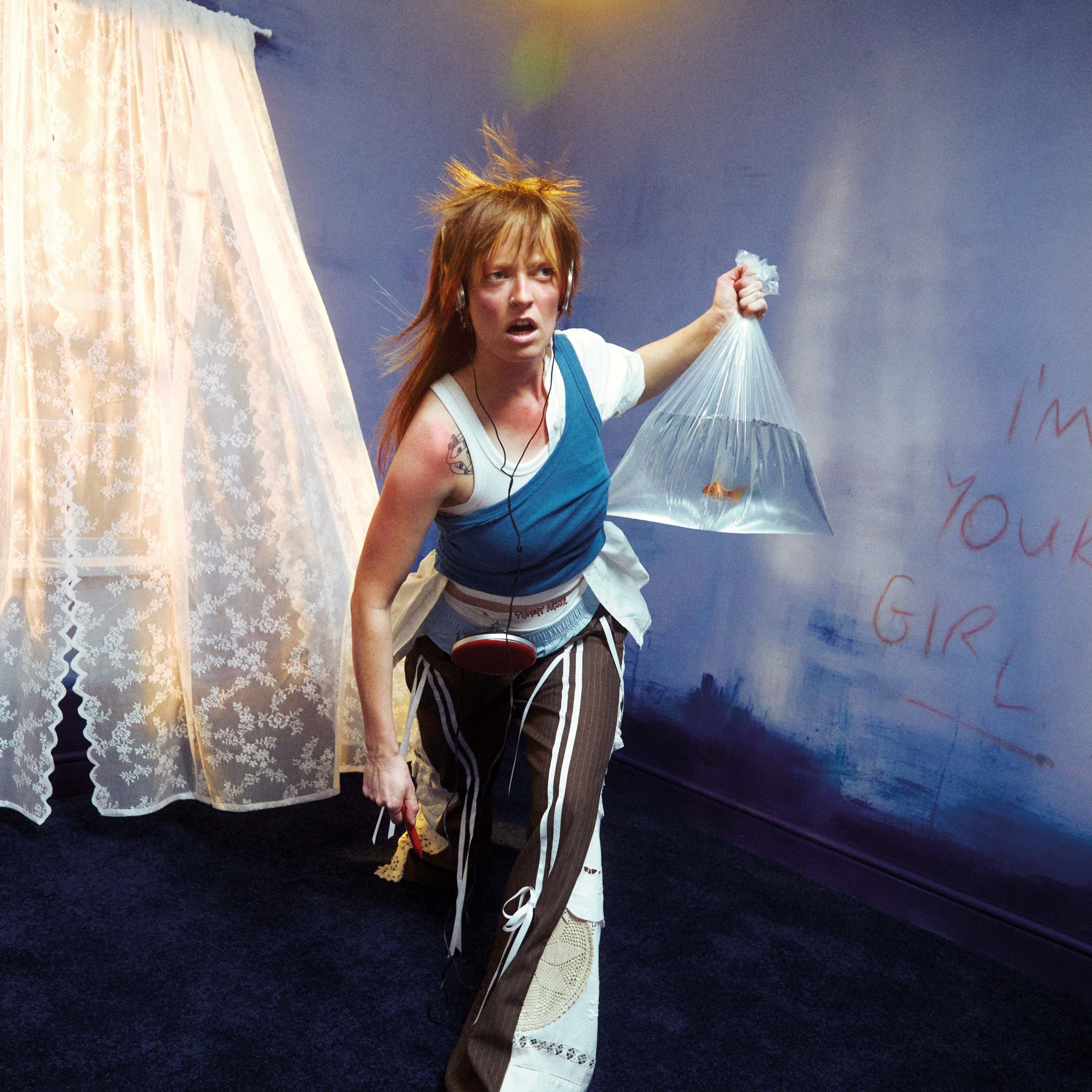
Credit: Nicole Ngai
She elaborates on the theme.
“There’s a lot of arguments, throughout the industry, that radio knows what people want to hear,” Orla continues. “But that’s bullshit. People in Ireland have much more eclectic and interesting tastes then they were ever given credit for – they just need to be exposed to more. I’m very glad to see the back of that acoustic trend, because I found it so boring. I feel much more excited about Irish music than ever.
“Going back to the album title, I find a lot of strength in Irish female artists. Sinéad O’Connor is one of my heroes. I’ve been reading her autobiography again and I just love her. She was so fearless. I was also thinking about Dolores O’Riordan a lot lately and how amazing she is, what she’s done not only for Irish music, but all music.”
With many Irish emigrants, yearning for home strengthens the longer and further one lives away. As Orla and I chat, I’m reminded of the ‘Hero’s Journey’ archetype. In its most basic form, a hero goes on an adventure, emerges victorious from a defining crisis and then returns home changed for the better.
Embarking on a journey of her own, Orla set off for the UK after struggling to carve out a niche for herself in Ireland. The move proved advantageous, with two albums now under her belt and an entire constellation of opportunity opening up. For now, she plans to stay where she is, but the Dubliner is certainly eyeing a homecoming in the future.
Advertisement
“I’d 100% return to Dublin in the long term,” she tells me. “My entire soul is at home – and it’s still home after all these years.”
Everybody Needs A Hero is out now.
This post was originally published on this site be sure to check out more of their content


